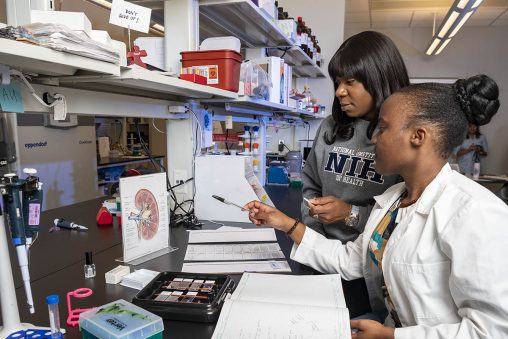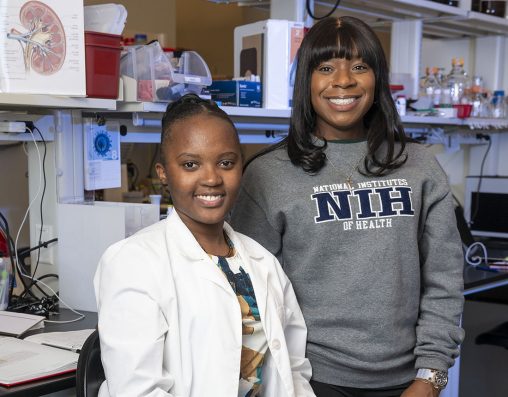
Wright State physiology and neuroscience students Kelia McMichael, left, and Adeline Nshuti participated in the National Institutes of Health Short-Term Research Experience Program to Unlock Potential program, administered by the National Institute of Diabetes and Digestive and Kidney Diseases.
In an exceptional display of academic prowess and dedication to medical research, two Wright State University students distinguished themselves during a summer internship.
Adeline Nshuti and Kelia McMichael, both senior honors students majoring in physiology and neuroscience, earned spots in the highly competitive National Institutes of Health Short-Term Research Experience Program to Unlock Potential (STEP-UP) program.
The program, administered by the National Institute of Diabetes and Digestive and Kidney Diseases, provided them with the opportunity to engage in cutting-edge research and connect with experts.
Nshuti was born and raised in Rwanda and moved to Ohio in 2017. She graduated from Wayne High School in 2019 and received her associate degree in liberal arts and science from Sinclair Community College before transferring to Wright State in 2022 to pursue a degree in physiology and neuroscience.
“This major offers me a hands-on approach that fosters critical thinking and attention to details,” said Nshuti. “It has provided me with the opportunity to build a foundation for my future in medicine.”
McMichael, a native New Yorker transplanted in Ohio when she was 2 years old, took an untraditional path to success. She graduated from Northmont High School in 2013 and worked as a nurse’s aide for several years, specializing in geriatric and long-term care.
In 2020, she enrolled at Wright State to pursue her dream of becoming a medical doctor. After a short time as a biological science major, she switched to physiology and neuroscience.
“I chose to major in physiology and neuroscience due to its unparalleled ability to nurture my critical thinking skills,” said McMichael. “This major was best suited to prepare me for my long-term goal of being a medical doctor. I’ve learned so much. I’ve learned to think critically like a scientist.”
The students have been mentored by Clintoria R. Williams, Ph.D., associate professor of neuroscience, cell biology and physiology, and the Kidney Pathophysiology Research Group at Wright State. Both Nshuti and McMichael have seized the opportunity to delve into their respective areas of research.
Nshuti focused on unraveling the intricacies of tacrolimus, a vital drug in organ transplantation with potentially adverse side effects on blood pressure and kidney function.
McMichael investigated the effects of zinc deficiency on kidney function and blood pressure regulation.

Wright State honors students Adeline Nshuti and Kelia McMichael presented their kidney-related research at a National Institutes of Health conference.
Nshuti and McMichael presented their groundbreaking research at a prestigious three-day conference at the National Institutes of Health headquarters in Bethesda, Maryland. The experience with the STEP-UP program was transformative for both students.
“People take different routes to reach their career goals, and that it is the passion and love for your dreams that will motivate you even when those goals seem hard to reach,” said Nshuti.
McMichael extolled the exposure to a myriad of scientific voices and perspectives and said, “Hearing firsthand from world-leading scientists in different stages of their career was amazing.” She also said that having the opportunity to ask them questions to get practical insight and wisdom was an indelible experience.
Both students said their time in the summer program was rewarding.
Nshuti networked with a scientist who frequently travels to Rwanda to study diabetes.
“This conference expanded my professional network, and I established meaningful connections that could potentially open doors for future opportunities,” she said.
McMichael envisions a future as a medical scientist, bridging the gap between clinical care and laboratory investigation, dedicated to the holistic understanding and treatment of patients.
Nshuti applauded the exceptional guidance of Williams.
“I’m grateful to be part of a great team in Dr. Williams’ research lab,” Nshuti said. “As challenging as research or school can get, the great mentorship from my P.I. and faculty inspire me to grow academically and professionally.”
McMichael credited the Physiology and Neuroscience program, directed by Patrick M. Sonner, Ph.D., lecturer in the Department of Neuroscience, Cell Biology and Physiology, for providing a strong academic and scientific foundation.
“The most amazing thing about doing research is I have an opportunity to apply the knowledge I gained from class in the lab,” said McMichael. “Our mentor Dr. Williams trains us to think critically and independently. She has inspired me to confidently solve problems, ask questions and most importantly learn from mistakes.”
Williams said she was proud to watch her studies participate in the National Institutes of Health program.
“Their passion, curiosity and tireless work ethic have not only propelled them forward but have also illuminated the boundless potential within each of them,” Williams said. “This internship marks not only a milestone in their academic journey but a testament to their unwavering commitment to advancing scientific knowledge. As a mentor, I am humbled and inspired by their accomplishments, and I have no doubt that they will continue to shine brightly in the world of research and beyond.”

 Wright State psychology team studies ways to identify fatigue in pilots, drivers
Wright State psychology team studies ways to identify fatigue in pilots, drivers  Wright State videographer Kris Sproles wins Regional Emmy and Ohio journalism award
Wright State videographer Kris Sproles wins Regional Emmy and Ohio journalism award  Wright State Boonshoft School of Medicine ranked among the nation’s best for 2024 by U.S. News
Wright State Boonshoft School of Medicine ranked among the nation’s best for 2024 by U.S. News  Exposing biotechnology
Exposing biotechnology  Wright State faculty member Dan Noel uses unique background to inspire new leaders
Wright State faculty member Dan Noel uses unique background to inspire new leaders 